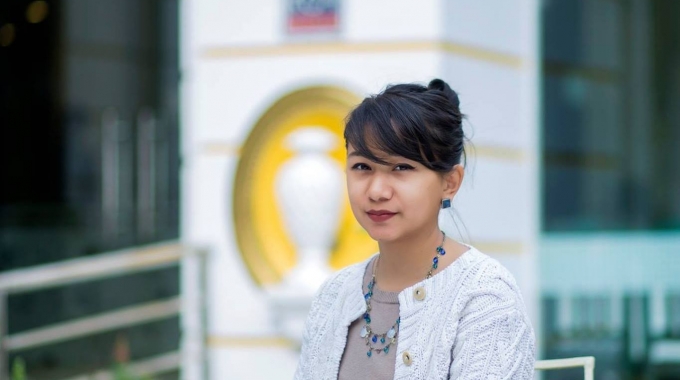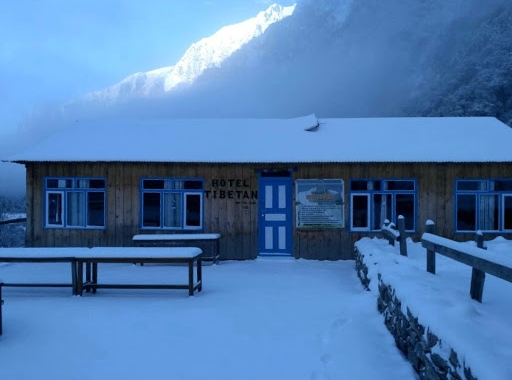
Investor Spotlight: Trishagni Sakya
Meet Trishagni Sakya! She invested in and sits as one of the board members of Orange Ball Pest Control, a startup that graduated from Year 1 of the I-Cube business incubation program. Interested in becoming a seed investor? Drop in during our second round of Investor Meetups on Thursday, December 12th at Nepal Communitere.

What drew your interest in the area of business and investments in Nepal?
Coming from a family of business people, entrepreneurship was always something I gravitated towards. However it really took shape when I joined my masters program at Johns Hopkins University. The focus of my degree was on Economic Development and Social Enterprises, specifically private equity and social enterprise in developing countries.
That was where I really got to ground my interests in economic theory. Later I worked as a consultant doing impact investments in emerging markets like India. When I moved back to Nepal, I was hungry to put my theoretical knowledge and experience from the impact investment sector into practice.
You sit on Orangeball’s company board, how does this relationship work?
The board meetings take place every 6 weeks and are coordinated and administered by Safal Partners. Since the startup’s investment is disbursed based on their ability to perform clearly outlined investment milestones, the meetings tend to center around tracking progress towards those milestones.
But of course the board has to stay flexible with the current situation of the enterprise. It’s not just about making the entrepreneur go at lightning speed to achieve the milestones. We challenge the entrepreneur to consider things they might not have before and push them to really solidify their current business operations. Your house needs to be in order before your can scale and successfully manage that growth as a business.
Are there any misconceptions Nepali startups have about the investor-investee relationship?
Startups can be a bit starry-eyed about investors, sometimes thinking investors can immediately make fantastical things happen for their business. It’s easy to get sucked into the hype about getting investors, particularly high-profile investors. Investors can unlock a lot for both the entrepreneur and the business, but it’s up to the business to understand the type of investor they need and why.
Also, expectations have to be realistic. They way I see it, at its core the investor-investee is a relationship based on trust. We need to trust your idea, trust it is ready to hit the market and most importantly trust that your team is the one to make it happen. That takes time to cultivate.
And at the end of the day, never forget that it is a business relationship. Even after an investor has come on board, they are not going to coddle you and make business deals or partnerships without any strategic alignment or if it is clearly not a sound business decision for them. An investor only comes in because they are looking for some sort of return, financial or otherwise.
Were there any expectations you had working with such early stage companies? What has been the most surprising or interesting learning from working with Nepali startups?
I came into it pretty open-minded, trying to understand the investment culture and practice in Nepal. Being a board member of Nepal Communitere, I got exposed to a lot of young Nepali startups through the I-Cube business incubation program and subsequent investor meet ups. It made sense that the first avenue through which I would invest would be Nepal Communitere. I don’t know if I would be such an eager investor without that relationship.
Since becoming a seed investor, I have been extremely impressed by the level of professionalism Safal Partners has brought to the post-investment process. Even I myself have learnt so much from how they function. It’s been a wonderful surprise how much I’ve learnt just by stepping outside my own circle and engaging with the other board members. We are all from such different tracks, and my fellow board members are so successful in their own right. It’s been a very rich and stimulating learning environment for me as a business person and investor.
Have you ever done investments of this type before, seed or angel level investments?
No, I had not done any personal investments before this. My main experience with the investment space was as a consultant helping the Overseas Private Investments Corporation make investments into Indian non-banking financial intermediaries.
From your perspective, what are the challenges you see in the seed investment space in Nepal?
Nepal itself is in new territory with private investments. There’s a lot more tinkering and pivoting that needs to happen for the space to grow and take shape. If we can encourage more investors into the market, then it’s going to mature faster. It needs a critical mass. There are sudden sparks, but they are not meeting to create a fire.
How comfortable do you think Nepali investors are getting into seed-level investments?
From what I have observed, not at all. Investors are still very risk averse. In fact, seed investment is an amazing opportunity for investors because we get to enter while the amount is low and learn first hand about the investment market.
Right now, the most popular financial product for the typical young professional in Kathmandu who has saved up a few lakhs is putting your money in a fixed deposit. Well, if you want to grow as an investor then diversify and try a new financial product. Becoming a seed investor was my opportunity to learn. My return on investment is getting to refine my instinct and methodology as an investor. For me it was a low cost way to implement what I had learnt through my Masters degree in theory, in a real world context.
From an insider point of view, what type of investor do you feel this is the right platform for?
I don’t want to say it’s for the investor with a risk appetite, because the risk is so low. Venture Capital is a more intimidating space, where one investor needs to put in 15-20 lakhs maybe more. With seed the amount is 1 to 2 lakhs which I think is a much more palatable number for people to enter. You want to grow as an investor, why wouldn’t you enter while it’s low?
If you’re an investor who has an appetite for learning and wants to keep a pulse on this growing space of investments in Nepal then you can’t find a better opportunity to do just that.


